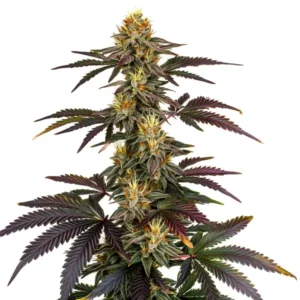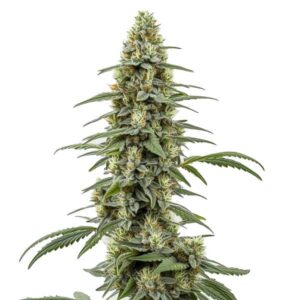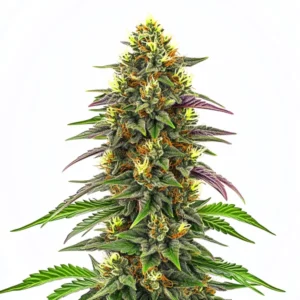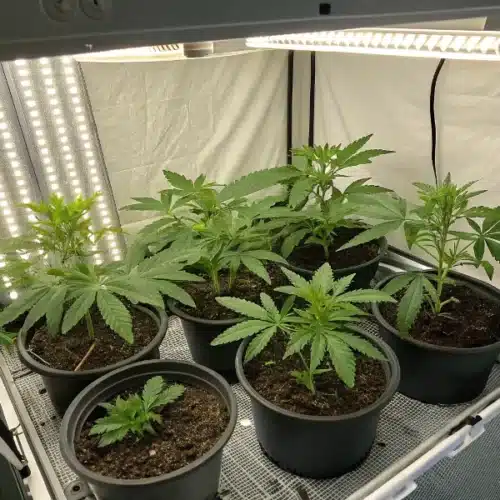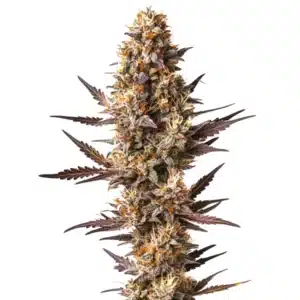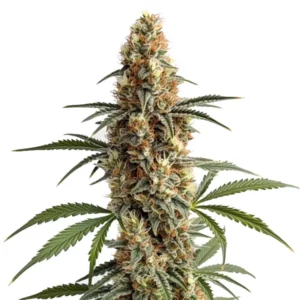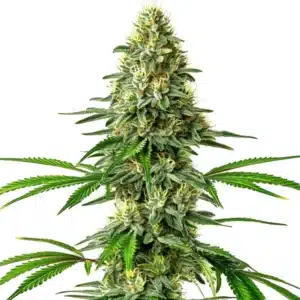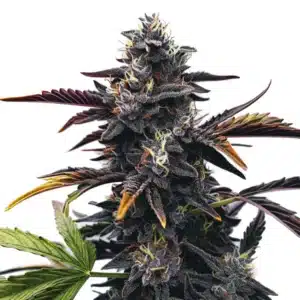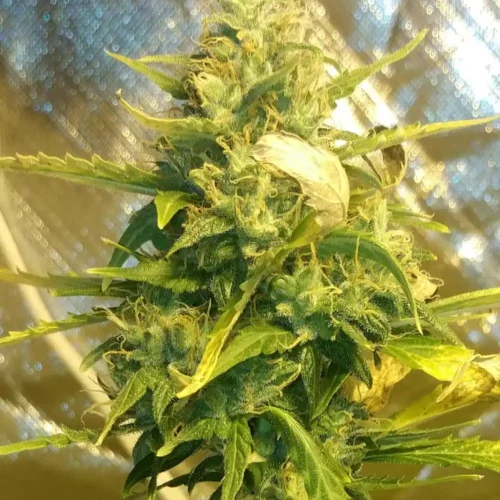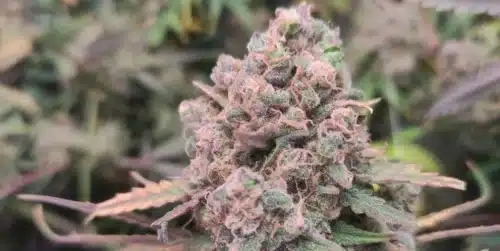Pineapple Kush Weed Strain Description
Pineapple Kush Strain is a unique cannabis strain that stands out for its sweet, tropical flavors and soothing effects. This strain is a hybrid with a genetic lineage of OG Kush and Pineapple, combining the best of both worlds. Pineapple Kush Weed Strain features mostly Indica characteristics, making it a favorite for relaxation and stress relief.
Recommended Strains
Pineapple Kush
 THC: 16 - 18%
THC: 16 - 18% Type of seed: Feminized
Type of seed: Feminized Phenotype: Mostly Indica
Phenotype: Mostly Indica Day to flower: 8 - 10 weeks
Day to flower: 8 - 10 weeks
The buds of this strain are medium in size and dense, coated with a frosty layer of trichomes, giving them a sticky texture. The strain boasts a flavor profile that includes notes of pineapple, earthy spices, and a subtle hint of cheese, making it a delightful experience for both the palate and the senses.
This Pineapple Strain is known for producing medium levels of THC, ranging from 16% to 18%, which makes it a versatile option for both new and experienced cannabis users. This strain is often chosen for its euphoric and uplifting effects, making it perfect for daytime use or social situations, while still offering the calming body high associated with Indica strains.
Promos & Deals
Environmental Requirements for Growing Pineapple Kush Weed Strain
Creating the right environment for growing this strain is essential to maximize its yield and potency. This strain thrives in temperate climates, preferring temperatures between 70-80°F (21-27°C) during the day and slightly cooler at night. Maintaining a stable environment with controlled humidity is crucial for the plant’s development.
For indoor cultivation, ensure your grow room or tent is equipped with proper ventilation and lighting. High-quality LED or HPS lights are recommended to support the plant’s photosynthesis process. During the vegetative stage, provide a light cycle of 18-20 hours per day, switching to 12 hours of light during the flowering phase to trigger bud development.
Outdoor growers should select a sunny location with well-draining soil. The Pineapple OG Kush strain thrives in warm, sunny environments, making it a great choice for regions with favorable climates. For growers in cooler areas, a greenhouse can help protect the plants from adverse weather conditions. Ensuring proper airflow is also crucial, as it helps prevent mold and mildew from forming on the dense buds of this highly sought-after strain.
Setting Up the Growing Cannabis Space
Indoor Cannabis Cultivation
When growing Pineapple Kush Weed Strain indoors, setting up an efficient and well-organized grow space is key. A grow tent with reflective walls or Mylar sheets can help optimize light distribution and improve overall plant growth. Ventilation is essential, so make sure your space is equipped with an exhaust fan and carbon filter to manage heat, humidity, and odor control.
In terms of the growing medium, this strain can thrive in both soil and hydroponic systems. For beginners, high-quality soil with good drainage and organic nutrients is recommended. The pH levels should be kept between 6.0 and 6.5 to ensure optimal nutrient uptake. As the plant grows, training techniques like low-stress training (LST) can help control the plant’s height and improve light penetration.
Outdoor Cannabis Cultivation
For outdoor cultivation, Pineapple Kush Weed Strain enjoys sunny and warm environments. The soil should be well-draining and rich in organic matter to support root development. You can grow this strain in large pots or fabric containers, which offer better control over the soil’s quality and aeration. Additionally, using stakes or trellises to support the branches is recommended, especially during the flowering stage when the dense buds can weigh down the plant.
Outdoor growers should also take precautions against pests and adverse weather by using netting or greenhouses if necessary. Wind protection is particularly important as strong gusts can damage the plant’s branches or stress the plant, reducing yields.
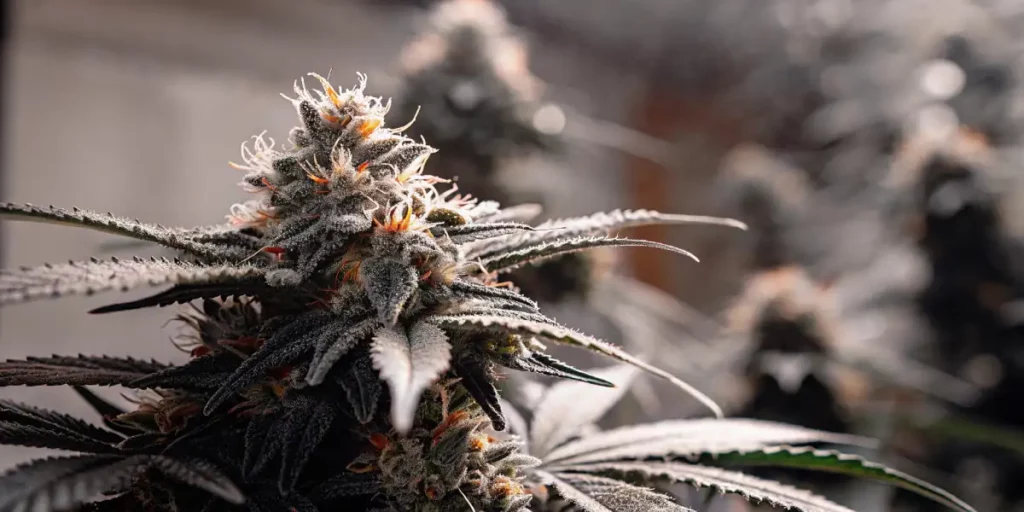
Propagation and Germination of Pineapple Kush Weed Strain
The germination process is the first step to growing healthy and productive Pineapple Kush Weed Strain plants. Start by choosing feminized seeds to ensure that your plants will produce buds. The process begins by soaking the seeds in distilled water or placing them between damp paper towels for 24-48 hours. The seeds will sprout small taproots, signaling they are ready for planting.
Once the seeds have sprouted, carefully place them into a pre-moistened growing medium such as a seedling tray or small pots filled with light, well-draining soil. Keep the seeds in a warm environment with temperatures between 75-80°F (24-27°C) and high humidity levels of around 60-70% for successful germination.
As the seedlings grow, provide indirect light at first, gradually increasing light exposure as the plants develop their first true leaves. Avoid exposing seedlings to strong light or intense heat to prevent stress. After the seedlings have grown a few sets of true leaves, they can be transplanted into larger containers for the vegetative phase.
Vegetative Phase of Pineapple Kush Weed Strain
During the vegetative phase, Pineapple Kush Weed Strain focuses on growing strong stems and leaves. The vegetative period typically lasts 4 to 6 weeks. During this phase, plants require ample light, water, and nutrients to develop properly.
Lighting: Indoor growers should maintain a light schedule of 18-20 hours of light per day. LED or HPS grow lights with the appropriate spectrum for vegetative growth are recommended. Outdoors, this strain benefits from direct sunlight.
Nutrients: Pineapple Kush Weed Strain needs a nutrient-rich feeding schedule during the vegetative phase. Fertilizers high in nitrogen (N) are ideal to promote strong leaf and stem growth. Be sure to follow the manufacturer’s recommendations for feeding and watch for any signs of nutrient deficiencies.
Watering: Water your plants when the top inch of soil feels dry, but avoid overwatering as this strain does not tolerate waterlogged conditions. It’s important to let the soil dry out slightly between waterings to prevent root rot and other moisture-related issues.
Flowering Phase of Pineapple Kush Weed Seeds
The flowering stage is when Pineapple Kush Weed Strain plants develop their dense buds. This stage typically lasts 8-10 weeks. The light schedule should be switched to 12 hours of light and 12 hours of uninterrupted darkness to trigger flowering. During this phase, this strain produces its famous pineapple and earthy aromas.
Lighting: The light intensity should remain high during flowering, but ensure the lights are not too close to the canopy to avoid light burn. Consistent darkness is crucial during this stage, as any light interruptions can cause the plants to revert to the vegetative phase.
Nutrients: During the flowering phase, switch to a bloom fertilizer high in phosphorus (P) and potassium (K) to support bud development. Monitor the plants for any nutrient imbalances, and flush with pure water during the last two weeks of flowering to enhance the taste and smoothness of the final product.
Cannabis Fertilization and Nutrition
Nutritional requirements for Pineapple Kush Weed Strain change throughout its life cycle. During the vegetative stage, the plant requires more nitrogen, while during flowering, it needs higher levels of phosphorus and potassium to promote healthy bud growth. High-quality organic or synthetic fertilizers designed for cannabis are recommended.
Pest and Disease Control for Cannabis Growing
Pineapple Kush Weed Strain, like any cannabis strain, is susceptible to pests and diseases. Regularly inspect your plants for common pests like spider mites and aphids, and take preventive measures like using neem oil or introducing beneficial insects. Ensure your grow space has proper ventilation to prevent mold and mildew, especially during the flowering stage when the dense buds of this strain are most vulnerable.
Harvesting and Curing Pineapple Kush Weed Strain
Harvesting this strain at the right time is crucial for maintaining its potency and flavor. Use a magnifying glass to check the trichomes; they should be milky white with some turning amber when the plant is ready for harvest. Carefully trim the buds and hang them to dry in a well-ventilated space with a temperature of around 60-70°F (15-21°C) and humidity levels between 50-60%. The drying process should take around 7-14 days.
After drying, place the buds in airtight jars for curing, opening them daily for the first week to release moisture and improve the flavor and potency. Curing should last 2-4 weeks for the best results.
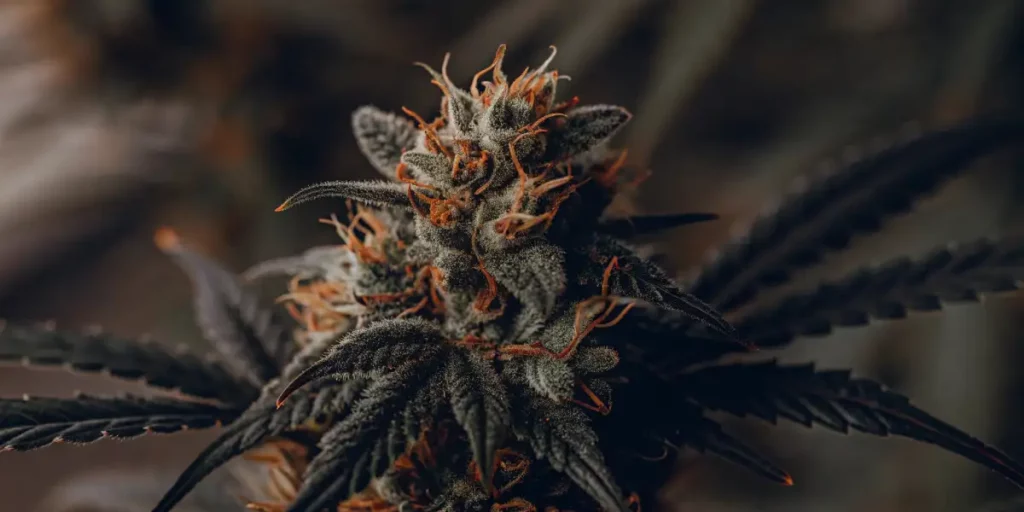
Is Pineapple Kush Weed Strain Indica or Sativa?
Pineapple Kush Weed Strain is a hybrid strain with mostly Indica genetics, offering a relaxing body high typical of Indica strains. However, it also provides uplifting and euphoric effects associated with Sativa strains, making it a versatile option for both daytime and nighttime use.
Advantages of Pineapple Kush Strain
- Medium THC levels (16%-18%) make it suitable for a wide range of users.
- Resilient and beginner-friendly with easy growth characteristics.
- Delicious tropical flavor profile with notes of pineapple and earthy spices.
- Produces dense, resinous buds ideal for high-quality harvests.
- Relatively short flowering time of 8-10 weeks, making it efficient for growers.
- Adaptable to both indoor and outdoor growing environments.
Disadvantages
- Requires precise monitoring of humidity to prevent mold during the flowering phase due to its dense buds.
- The tropical and fruity aromas can be quite strong, necessitating good odor control in indoor setups.
- May need support for the branches as the heavy buds can cause them to bend or break.
- Although it has moderate THC levels, some users may prefer stronger strains for a more intense experience.
Why Buy Pineapple Kush Weed Strain
Pineapple Kush Weed Strain is a great option for both recreational and medicinal users. Its unique tropical flavors, paired with its balanced effects, make it a favorite among cannabis enthusiasts. Here are some reasons why you should consider adding this strain to your collection:
- Unique Flavors: This Strain offers a delightful blend of fruity pineapple with earthy undertones, making it a pleasant strain to consume.
- Relaxing Yet Uplifting: The Indica-dominant hybrid effects make it a great choice for users seeking relaxation without heavy sedation, while the Sativa influence provides an uplifting mental boost.
- Versatile Use: Ideal for social situations, creative endeavors, or simply unwinding after a long day, this strain provides a versatile high that can cater to various needs.
- Medical Benefits: Pineapple Kush Weed Strain is known to help with stress, fatigue, and muscle spasms, offering relief for those with chronic conditions.
- Beginner-Friendly: With its moderate THC levels and relatively easy growing characteristics, this strain is an excellent option for novice cultivators looking to start with a reliable strain.
Common Problems in Growing Pineapple Kush Weed Strain
Even though this strain is a resilient strain, growers may encounter some challenges. Here are a few potential issues and how to address them:
Nutrient Deficiencies: Pineapple Kush Weed Strain may show signs of nutrient deficiencies if not fed properly. Yellowing leaves can indicate a nitrogen deficiency, while other nutrient issues may arise during the flowering phase if the plant doesn’t receive enough phosphorus or potassium.
Humidity Control: Due to the density of this strain’s buds, high humidity can lead to mold and mildew, especially in the flowering phase. Invest in a dehumidifier if growing indoors to maintain optimal humidity levels.
Pests: As with most cannabis strains, pests such as spider mites or aphids can attack this plants. Regularly inspect the plants and consider using organic pest control methods, such as neem oil or introducing predatory insects.
Similar Strains to Pineapple Kush Weed Strain
- OG Kush: As one of Pineapple Kush Weed Strain’s parent strains, OG Kush shares the earthy and piney flavors and offers a stronger THC punch with more relaxing Indica effects.
- Pineapple Express: Known for its uplifting effects and tropical flavors, Pineapple Express is another hybrid with similar fruity notes and a slightly higher THC content.
- Blueberry Kush: This Indica-dominant strain is well-known for its relaxing and euphoric effects, similar to Pineapple Kush Weed Strain, but with a berry flavor profile.
Tips for Professional Cannabis Growers
For professionals looking to optimize their Pineapple Kush Weed Strain yield, consider the following tips:
Advanced Training Techniques: Utilize techniques such as topping and low-stress training (LST) to manage the height of your plants and maximize light exposure. This helps promote even growth and increases overall bud production.
Precise Nutrient Management: Professionals can push this strain to its limits by carefully monitoring and adjusting the nutrient mix. Investing in quality cannabis-specific fertilizers will ensure the plants receive all necessary macronutrients and micronutrients.
Environmental Controls: For optimal results, maintain a controlled environment with consistent temperature and humidity levels. Automation tools like temperature and humidity controllers, along with CO2 supplementation, can help maximize plant growth and yields.
Harvest Timing: Professionals should closely monitor trichome development to ensure harvesting at the perfect time for the desired potency and effects. Waiting until the trichomes are mostly cloudy with some turning amber will produce the best results.
FAQs
What is the THC content of Pineapple Kush Weed Strain?
The THC content of Pineapple Kush Weed Strain typically ranges between 16% and 18%, making it a moderately potent strain suitable for both beginners and experienced users.
How long does Pineapple Kush Weed Strain take to flower?
This strain has a flowering time of approximately 8 to 10 weeks. Outdoor growers can expect to harvest by late September to early October in most regions.
What are the medical benefits of Pineapple Kush Weed Strain?
This strain is commonly used for relieving stress, fatigue, and muscle spasms. Its balanced effects make it a popular choice for both medicinal and recreational use.
What flavors and terpenes are found in Pineapple Kush Weed Strain?
This strain has a tropical flavor profile with hints of pineapple, cheese, and earthy spices. Its terpene profile includes Alpha-Pinene, Alpha-Terpineol, and Beta-Caryophyllene.
Is Pineapple Kush Weed Strain easy to grow for beginners?
Yes, this strain is considered beginner-friendly due to its resilient nature, moderate THC levels, and relatively simple growing requirements.


